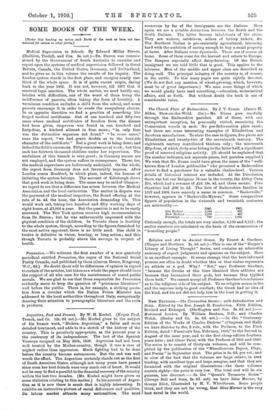Argentina, Past and Present. By W. H. Koebel. (Kegan Paul,
Trench, and Co. 12s. 6d. net.)—Mr. Koebel gives to the subject of his former work, " Modern Argentina," a fuller and more detailed treatment, and adds to it a sketch of the history of the country. This is peculiarly appropriate, as the present year is the centenary of its independence. The last of the Spanish Viceroys resigned on May 25th, 1808. Argentina had not been well treated by the Mother-country, though it was a case of neglect rather than oppression. Much fighting had to be done before the country became autonomous. But the end was well worth the effort. The Argentine certainly stands out as the first of South American States, although not many years have passed since even her best friends were very much out of heart. It would not be easy to find a parallel to the financial recovery of the country within the last two decades. (Mr. Koebel might have given us some statistics relating to this matter.) In his account of Argen- tina as it is now there is much that is highly interesting. It exhibits an instructive picture of racial differences and qualities. Its labour market attracts many nationalities.- The most numerous by far of the immigrants are the Italians. Here again we see a notable distinction between the North and the South Italians. The latter become inhabitants of the cities. They are waiters, cabdrivers, sellers of lottery tickets, &c. The Northern Italian is pre-eminently agricultural, labouring hard with the ambition of saving enough to buy a small property at home. After Italians come Spaniards. These are of course at home. Some of them come for the harvest and return to Europe. The Basques especially affect dairy-farming. Of the British immigrant we are told little that is good. This applies to the labourer. Men of the middle and upper class are described as doing well. The principal industry of the country is, of course, in the cattle. To this many pages are quite rightly devoted. (We do not find any mention of wheat-growing, which, however, must be of great importance.) We miss some things of which we would gladly have read something,—educatiois, ecclesiastical affairs, and so forth. But without doubt the book is one of considerable value.


























































 Previous page
Previous page